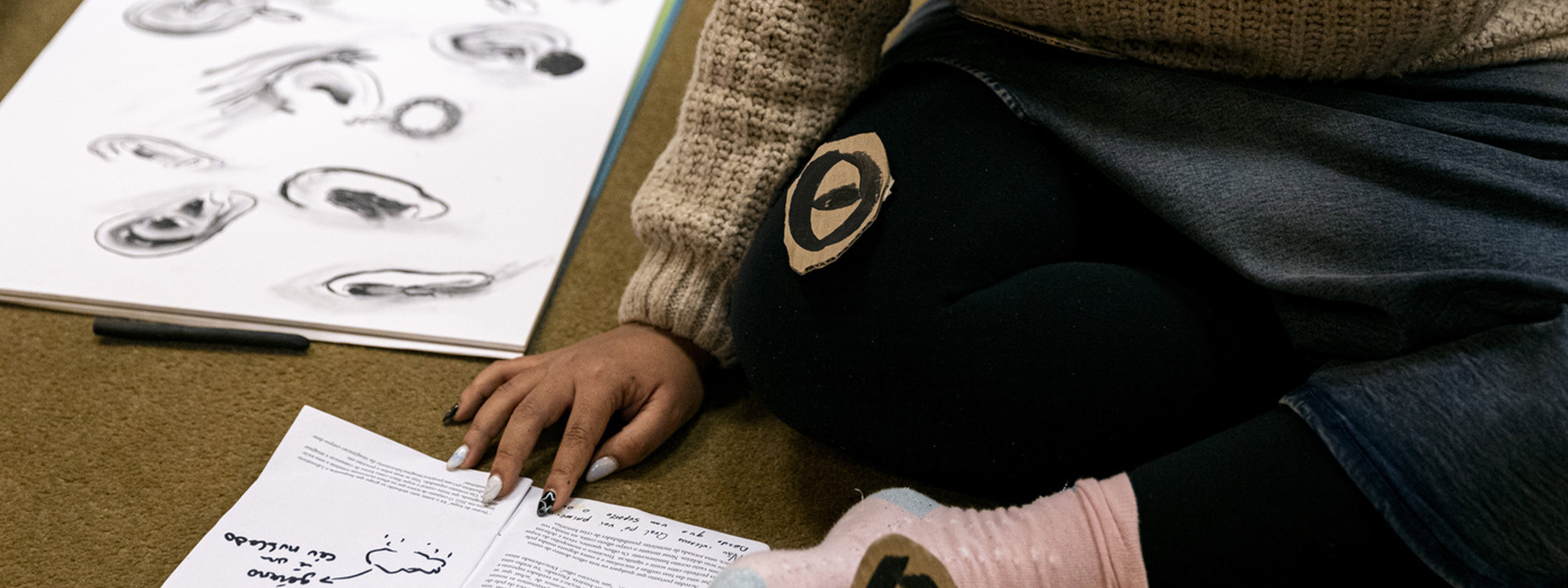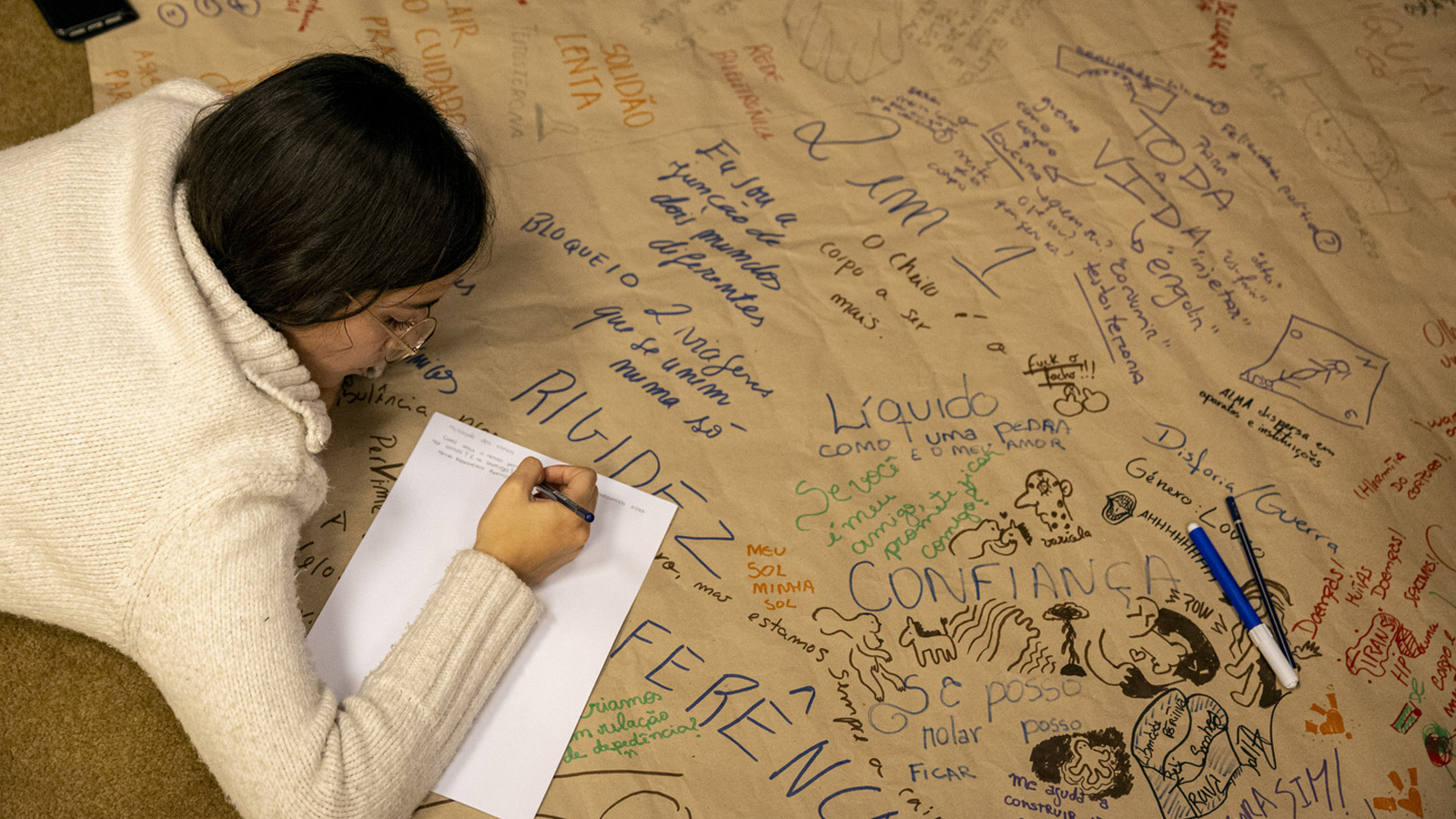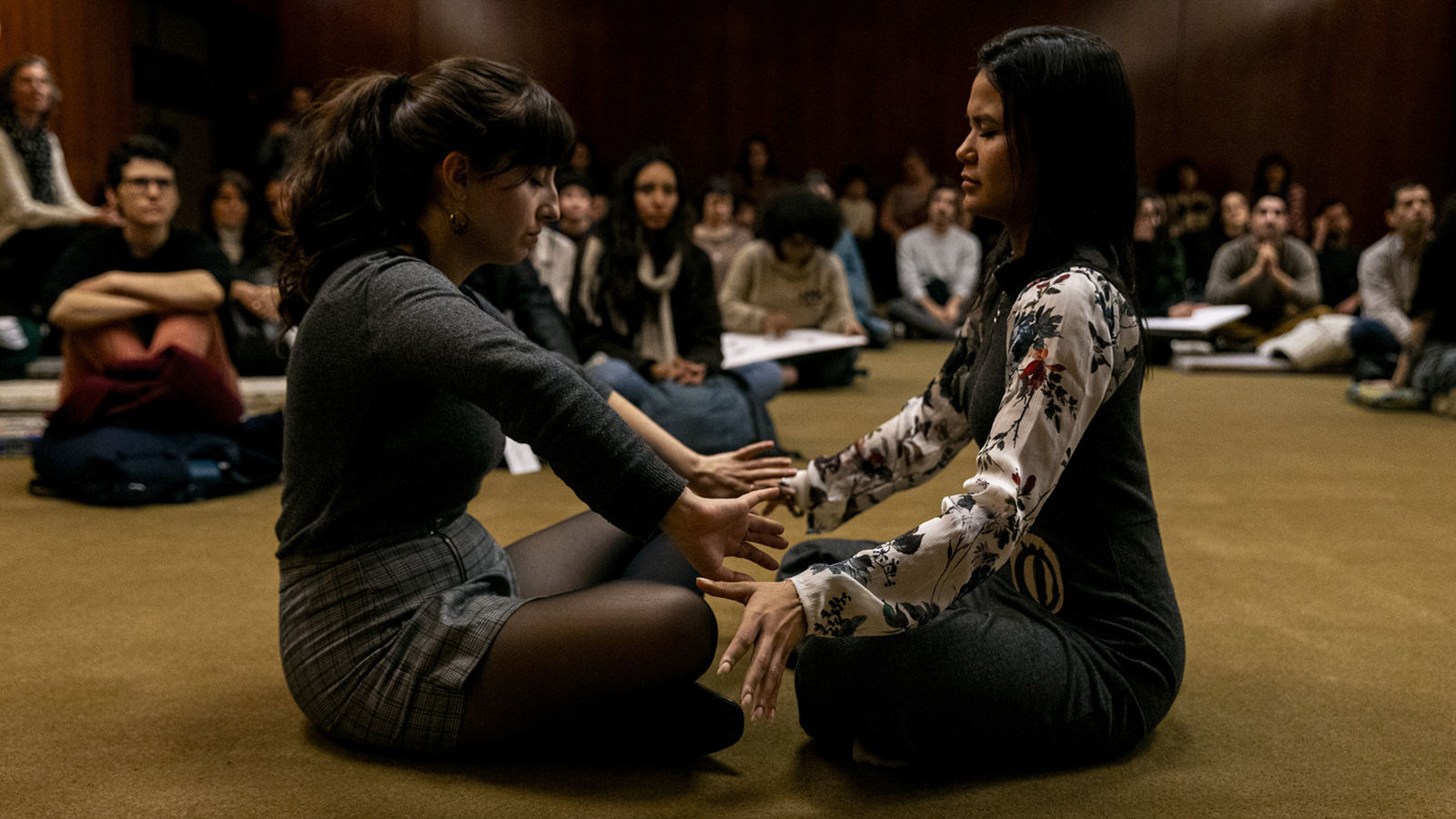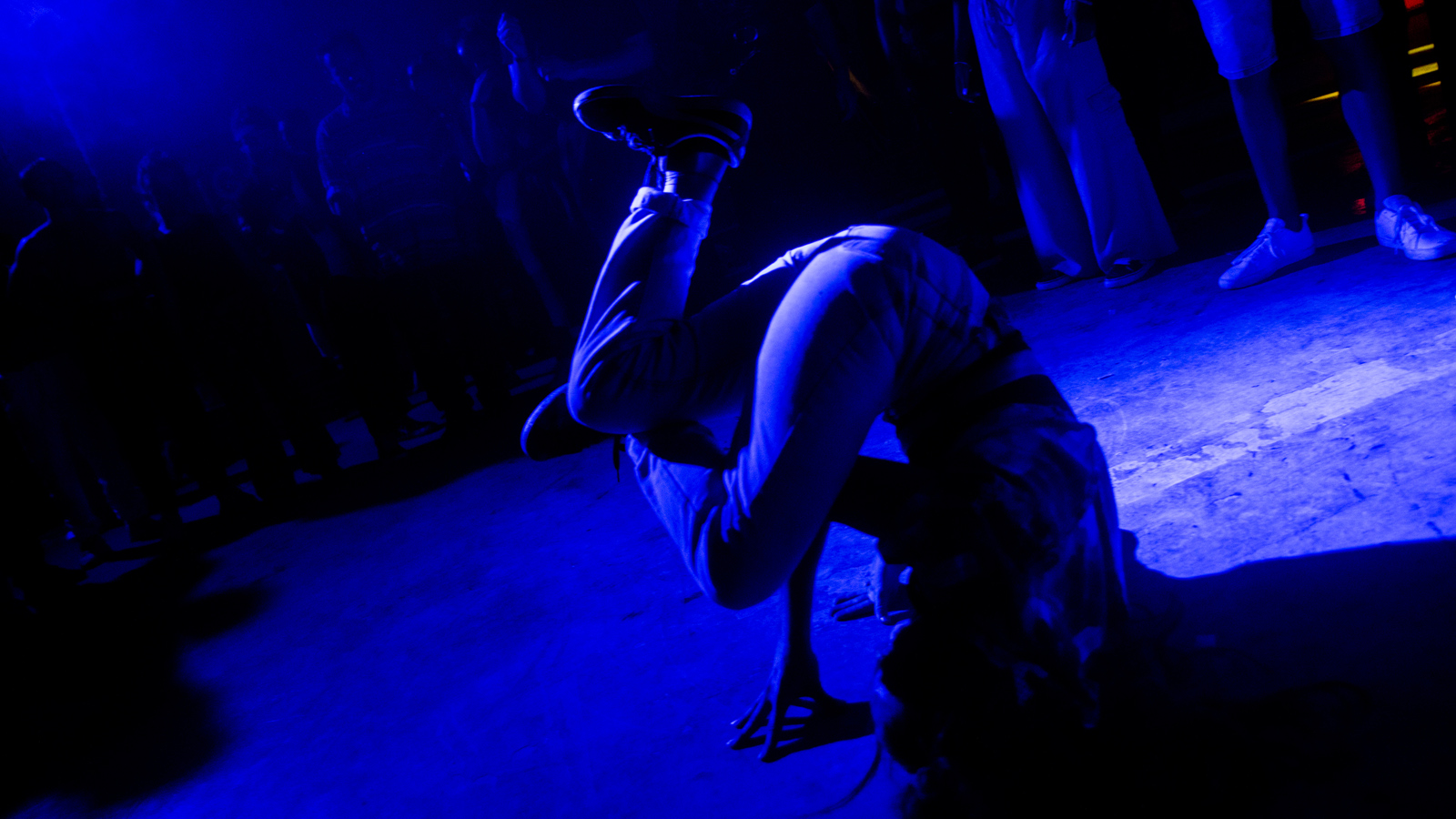
Open Call – Imagination Laboratory 2024
Inhabiting the body/ies – dance, absence, pleasure and disruption
From October 2024 to February 2025, we invite you to take part in the Imagination Laboratory that brings together young people in a platform of thought and action, led by the artist Piny in collaboration with Leo Soulflow, Nala Revlon, Catarina Rosa, Scúru Fitchádu, Xullaji, Fábio Krayze, Lúcia Afonso and ZABRA.
Are you aged between 18 and 25? Would you like to take part in a laboratory of experimentation, thinking and creation with artists whose work spans different disciplines? Are you interested in bodily and fictional practices related to the collective imagination?
The ‘Imagination Laboratory’ is a platform for experimentation, developed by a group of young people and interdisciplinary artists, which aims to explore new forms of thinking and acting in relation to the challenges of the present, and to imagine other possible futures.
As a starting point for the third iteration of this project, the artist proposes to consider the body in all its various dimensions and possibilities and, most importantly, as a creative and revolutionary force. Dance, absence, pleasure and disruption are the keywords for this exploration of the body as a place where all things start and end.
Each session sets experimental challenges (performative, sensory, visual and others) that aim to spark fictional and speculative processes. The laboratory is a plural space, open to a diverse spectrum of people, life experiences, know-how and interests, as well as a territory in which unexpected collaborations and unpredictable learning can arise.
The laboratory will last a total of 45 hours, spread over 15 sessions (see session dates) and will end with a public sharing, focusing on the process and constructed by the group. Applicants must be available to participate in at least 12 sessions.
Participation is free. Applications can be submitted until 4 October. Participants must attend the open information session on 8 October. Applicants will be contacted via email by 11 October to inform them of the results of the selection.
ApplyIntroduction by the artist
‘Inhabiting the body/ies
dance, absence, pleasure and disruption
Everyone has a body, but we don’t always know exactly how to live in it. ‘My body is me, but I am not my body.’ As certain as the fact that we were born and will die, having a body, one that yields and expires, is an absolute truth. And in the meantime?
This is the starting point for the laboratory, going from the idea of existing in a body to feeling what we feel in diverse manifestations of dance and how the body elicits memory and future. We imagine ourselves in different geographic, social and political contexts, understanding what bodies and dances produce, because they are celebration, protest, demand, sharing, prayer, transcendence, sexuality and identity. Knowing that voice is also a body. And perhaps there are other realities without body.
Through this, we will create scenes that are utopian, dystopian, real, unreal so that we can maybe, just maybe, create energy that transforms a non-linear time.
Bodies we have never seen, bodies we only dream of, bodies without limits, bodies that have and are a space to build.
Body – home; Body – limits; Body – expansion; Body – political
The body has the capacity to regenerate itself. The body also imagines. The body is a creative and revolutionary force. The body ends.
Could dance be a possible way of achieving a more aware and empathetic society? Dancing together is the revolution.
We aim to draw connections between the earthly and the spiritual, to understand the content that gave rise to the form, to link without specific contexts, to interpret them in different places and forge paths to new forms of creation and access. We look at post-colonialism, Afrofuturism, rethinking institutions, refocusing the periphery, creating bridges between the lost ancestral body-land and creating pluriversal content, not exclusive or Eurocentric, through sessions with guest speakers who challenge us to experiment, from the dense body to a bodiless existence.’
Piny



Participation terms and frequently asked questions
In this session, we will start some of the practices and answer any questions about what is involved in the laboratory. Participation is mandatory and non-attendance will exclude you from potential selection.
You will be contacted by email by 11 October.
This is an in-person laboratory. Participants who live outside Lisbon must ensure that they are available to take part and able to get to the venue themselves.
The laboratory will last for a total of 45 hours, spread over 15 sessions (see session dates). Applicants must be available to participate in at least 12 sessions.
08, 15, 22 and 29 Oct 2024
05, 12, 19 and 26 Nov 2024
03 and 10 Dec 2024
07, 14, 21, 28 and 29 Jan 2025
Time of all sessions: 18:00 – 21:00
Yes, those who complete the programme will receive a certificate of participation.
Yes, the sessions will be held in Portuguese. We recommend a basic level of Portuguese comprehension, but participants can express themselves in other languages.
The sessions will mostly take place at the Calouste Gulbenkian Foundation, although some might be held outdoors.
Yes. All you need is to be ready and willing to participate, no prior experience is required.
No, this project is educational, there is no remuneration.
Biographies
Piny
Piny works as a performer, choreographer, researcher, curator and teacher. In 1999, she began to study Middle Eastern and North African dance and their contemporary fusions and, since 2006, she has also devoted herself to the cultures of Hip Hop, Clubbing and Ballroom (Vogue). Highlights of her work include HIP. a pussy point of view, .G RITO and ONYX. She studied Architecture and completed a degree in Contemporary Dance. In 2023, she took Festival OU.kupa to the Teatro do Bairro Alto. She studies alternative ways of understanding intersectionality in being and making, through the study of astrology, tarot, yoga and non-Eurocentric philosophies.
Leo Soulflow
Leo Soulflow trained in Sports Sciences and Osteopathy, an area in which she has worked since 2016. In 2003, she started to focus on the area of dance, particularly Hip Hop, House Dance, Popping and Tap-dancing. As a performer, it is worth mentioning her participation in Bisonte and Carcaça, by Marco da Silva Ferreira, and .G RITO, by Piny. She is resident DJ at various clubs in Lisbon and at the Pump da Beat party, and is a Ballroom DJ in Portugal. Along with Carincur, she created the soundtrack for Piny’s Onyx.
Nala Revlon
Nala Revlon is a Luso-Brazilian performer and producer, a trailblazer and Mother of the Portuguese chapter of the Iconic House of Revlon. She shone in her categories – Women’s Performance and Female Figure – in Paris, London, Berlin and Rio de Janeiro, among other cities, where she won international prizes and European titles. She is the producer of the Pump da Beat party and, with the Vogue PT Chapter collective, she organises events aimed at the LGBTQIA+ community. She has performed in the pieces .G RITO, by Piny, and Carcaça, by Marco da Silva Ferreira.
Catarina Rosa
Catarina or Kenzi is a biologist at master's level specialising in the language, behaviour and evolution of birds. She has been part of the Orchidaceae collective since its conception in 2012. She works in organisation/curating and as a volunteer at events and festivals. She is the founder of the Dunas Livres Association – a female activist group for the conservation of Portugal's wild coastline. She recently joined the inner circle of Ecoversidades, which is committed to radically re-imagining higher education to cultivate human and ecological prosperity.
Scúru Fitchádu
Marcus Veiga has been linked to publishers, festivals and PLAY – Portuguese Music Awards. As Scúru Fitchádu, ‘he represents one of the most advanced and radical proposals in contemporary Portuguese music and ventures forth alone in a land that he himself invented, where he combines the speed and intensity of the funaná, which originated as the music of Cape Verdean resistance. Then, on top of all these aspects, that powerful voice emerges, hoarse and shouted, and that black body that lets itself be possessed on stage by the unbridled energy that each of his songs liberates.’ Rui Miguel Abreu
Xullaji
Xullaji is a rapper, sound designer, and a sound and visual poet. He has released three albums (Rapresálias, Rapensar and Rapressão) that stand out for the political/aesthetic forcefulness of their lyrics, given that hip hop, as a culture of resistance, is rooted in the African working class and its diaspora. His most recent schizophonia is Prétu, an Afronaut who merges samples and images of his African references with his electronic cosmos and his pan-afro-disruptive thought. He released Prétu 1 - xei di kor, rated by Ípsilon (Público newspaper) as one of the best 10 albums of 2023. He is the co-founder of Peles Negras Mascaras Negras – a theatre of darkening, a Black community artistic collective.
Fábio Krayze
Fábio Krayze was born in Angola, where he learnt the first steps of kuduro. He moved to Portugal at the age of 13, where he embarked on more formal dance training. He has performed with bands such as Buraka Som Sistema, he was finalist in the So You Think You Can Dance programme and semifinalist of Got Talent Portugal, with the group Funkymonkeyz. In 2018, he launched his musical career with the EP 2018 or Nothing. He performed in the piece Carcaça, by Marco da Silva Ferreira, and choreographed his first piece, Musseque, which premièred at Festival OU.kupa in 2023.
Lúcia Afonso
An artist, dancer, cultural mediator, anthropologist and project coordinator, she is also co-founder of MOSJAM Associação Cultural e Artística, a platform for developing clubbing and street dance. She works with national and international organisations, stimulating and developing activities for and with the community. She works with various dance companies that champion street dance, clubbing and capoeira, facilitating broad participation in different artistic and cultural events around the world. She is studying for a master’s in Cultural and Management Studies from ISCTE.
ZABRA
The Post-Human Art Research Centre, founded by Carincur and João Pedro Fonseca, focuses on a cross-disciplinary approach and an interspecies dialogue, which explores post-nature for contemporary creation. These lines of artistic research take different forms, including creation, production, publications and a programme of activities that include expanded computational arts, talks and workshops, contributing to greater democratisation in access to art, technology and science.